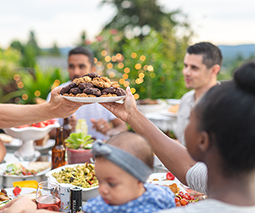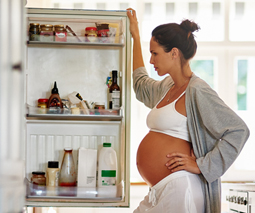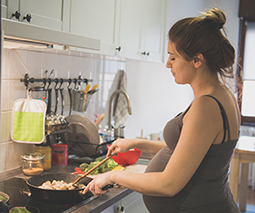Is it safe to take antidepressants while pregnant?

When Megan fell pregnant with her second child, she was worried.
Her first baby was just six months old and she’d been dealing with postnatal depression.
“I was definitely worried about how I was going to cope, and I didn’t want to just struggle through it either,” she said.
An honest conversation with her GP led to a prescription for antidepressants.
Read more on parenting:
- Photo of busy mum of 4 will strike a chord
- 8 things our grandparents did that nobody would now
- Time to panic: We officially become our mums at 33
Always talk to your GP, they’re there to help you
“My doctor assured me that we’d be fine and set me up with a course of antidepressants. I was also strongly encouraged to make regular appointments with a counsellor to talk through my feelings.”
According to women’s health GP Sneha Wadwhani, if a woman has a past history of PND, anxiety or depression or even a family history of mental health problems, she is at higher risk of developing PND in subsequent pregnancies.
“With each case, a careful risk-benefit analysis when considering drug therapy must be undertaken before a treatment plan is initiated,” says Sneha.
She adds: “Uncontrolled maternal depression has been documented in most research as being linked to smaller babies, and maternal anxiety has shown to have a strong correlation with high levels of the stress hormone cortisol in ten-year-old offspring, with an additional vulnerability to psychological problems in these children,” says Sneha.
“Both can cause attachment issues, affect breastfeeding behaviours and can be linked with problematic relationships between mother and child through the stages of development.”
What antidepressants are likely to be prescribed?
Sneha said that some antidepressants are safer than others for pregnant women, and again a full risk-benefit analysis should be done.
“Some antidepressants are safer than others and the choice of which drug to use depends on that risk-benefit analysis. Generally, antidepressants in the SSRI group (except mirtazapine paroxetine and venlafaxine) are preferred over drugs in the tricyclic group of antidepressants,” says Sneha.
“Generally antidepressants are thought to be safe when used appropriately. They may carry a small risk of birth defects as demonstrated in some recent research, but these results were not found to be statistically significant and so must be interpreted carefully.”
What are the risks?
Antidepressants carry different risks at different stages of the pregnancy depending on which drug is used.
“In the first trimester, early studies showed no adverse effects with SSRIs but later studies challenged this, showing a possible small risk of birth defects, though this was shown to be statistically insignificant, ” says Sneha.
“In the second and third trimesters, recent studies show perhaps an association with slightly smaller babies. In the third trimester, it has been observed that babies of mothers taking SSRIs may suffer mild respiratory distress. This is usually self-limiting and resolves within 14 days. It is unclear whether these are withdrawal or toxic effects and the data is small.”
How important is counselling or psychotherapy alongside the prescription?
Counselling and psychotherapy are valuable adjuncts to medication in depression, and in some cases, can be used to great success even without medication. These therapies help to teach coping strategies and therefore can help to prepare a mother better for the challenges ahead, perhaps more than drugs alone.
“It is well established that women who have support emotionally and psychologically through their pregnancy and postnatally – [those who] have ‘a village’ – display better outcomes in terms of postnatal and neonatal psychological health and wellbeing,” says Sneha.
For Megan, the counselling provided a safe space during her pregnancy and in the early days of adjusting to being a mother of two. It also helped her to wean herself off the antidepressants when she was ready.
“It took me about two years after my second baby to feel ready to stop the medication,” says Megan.
“Being able to talk to my counsellor and slowly reduce the dosage with my GP definitely helped that adjustment. I felt more supported and confident generally.”










